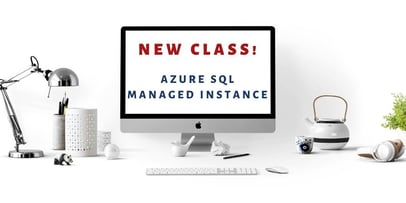Choose the Right Azure SQL Platform for Your Data


It can be hard to know which Azure SQL Platform to use for your data. If you’re one of those people and would like to learn more about the options Azure provides to architect robust solutions, we’re here to help. In a recent webinar, I spent some time comparing common functionality and options (including demos) for different Azure SQL services to help you decide if you’re looking to migrate or start new projects within Azure.
There are basically four options to run SQL within Azure. The most used option currently is IaaS – Azure VM running SQL Server. You also have a few PaaS options. There is PaaS SQL Instance with Azure SQL Managed Instance, which was just released recently in public preview. The final two are PaaS SQL Databases – Azure SQL DB and Azure SQL DW.
So, which one is right for you? For me it boils down to two factors (although with many nuances):
- Do you want to run Infrastructure as a Service (IaaS) or Platform as a Service (PaaS)?
- What type of workloads (and what size workloads) are you running?
Here’s a look at some pros/cons of Iaas vs PaaS:
IaaS
- Pros
- Greater control over your environment
- Can be lower server cost (although there are many factors that can change this)
- Full feature parity with on prem
- Con
- More maintenance time – With more power comes more responsibility
PaaS (Serverless)
- Pros
- Ease of use, fast spin up time (We can spin up a SQL DB from nothing in 3 minutes)
- Less maintenance time
- Cons
- Can be a higher server cost (again, there are many variations here)
- Possible feature differences compared to on prem
My recommendations? I have a few:
1. Choose PaaS over IaaS when possible. This is the current trend in the industry. Using PaaS will reduce your maintenance chores, it will increase your development agility and you will have the advantage of new features.
2. Choose Azure SQL DW IF it fits your data. Azure SQL DW is great for large, well modelled workloads and large queries but is not the correct platform for all data warehouses, such as small queries or OLTP workloads. It does require new development patterns to take advantage of the MPP (Massively Parallel Processing). Be sure to pay attention to feature differences with Azure SQL DB.
3. Use Azure SQL DB if you can and when Azure SQL DW doesn’t make sense. Azure SQL DB is great for new applications and application development. It has multi-tenant capabilities, easy replication and built in backups and index tuning advisor. It enables you to manage data less and “use” it more.
The bottom line is that most environments will use a different mix of options, so I recommend looking into all the options and combining them for the best fit in your environment. I’ll also say, if you’re in IT and have not looked into Azure, you should start now. Azure is here, and we should all be looking into how we can take advantage of it.
Again, watch the full webinar below for more details of the comparisons, as well as demos.
If you have other questions about what platform is right for your organization or you’d like help in getting started with Azure, we’re the people to talk to. Visit our website or contact us to start a conversation today.
Sign-up now and get instant access

ABOUT THE AUTHOR
Free Trial
On-demand learning
Most Recent
private training







-1.png)
Leave a comment